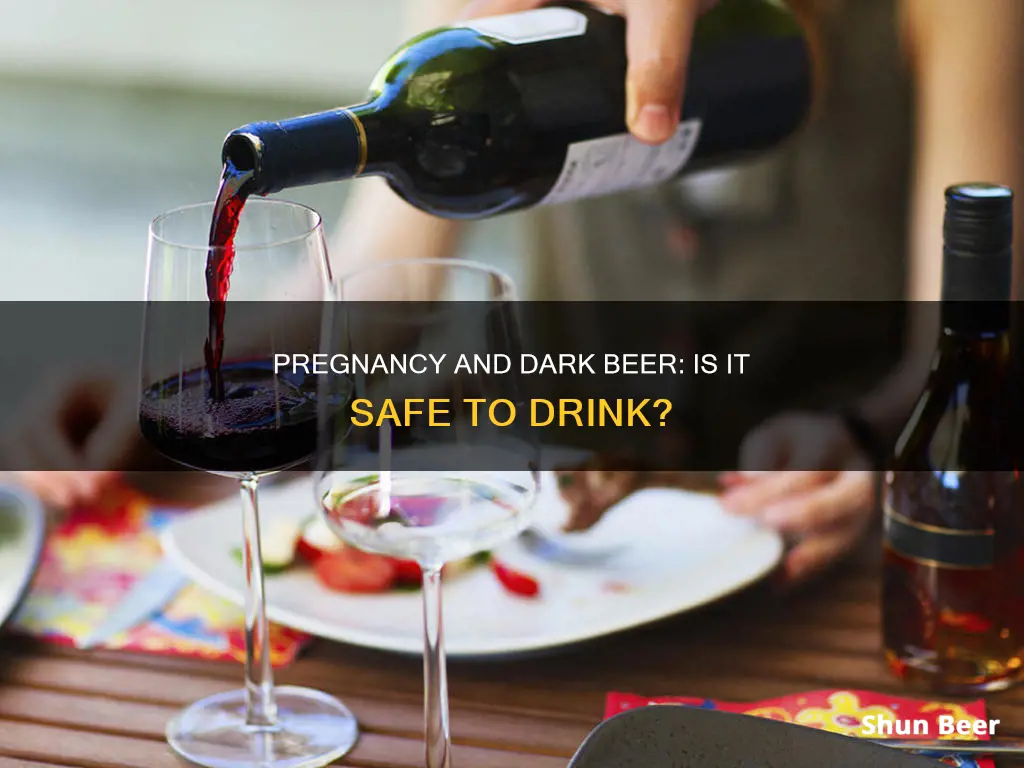
Drinking alcohol while pregnant is a controversial topic, with some doctors recommending that pregnant women completely abstain from alcohol, while others say that light drinking is unlikely to harm the baby. However, the general consensus is that there is no amount of alcohol that has been proven safe for pregnant women to consume. The CDC, the U.S. Surgeon General, the American College of Obstetricians and Gynecologists, and the American Academy of Pediatrics all advise pregnant women to refrain from drinking alcohol. Drinking during pregnancy can lead to fetal alcohol spectrum disorder (FASD), which can cause problems with learning, behaviour, joints, bones, muscles, organs, managing emotions, and developing social skills. Additionally, drinking while pregnant can increase the risk of miscarriage, premature birth, and low birth weight. While non-alcoholic beers are becoming a popular option for pregnant women, it's important to note that they can still contain up to 0.5% alcohol, and there is limited research on their potential effects on fetal development. Ultimately, the decision to drink alcohol while pregnant is a personal one, but it's important to consult with a healthcare provider to understand the risks involved.
| Characteristics | Values |
|---|---|
| Is it safe to drink dark beer while pregnant? | It is not recommended to drink alcohol while pregnant. |
| What are the risks of drinking alcohol while pregnant? | Drinking alcohol during pregnancy increases the risk of miscarriage, premature birth, low birth weight, stillbirth, and fetal alcohol spectrum disorder (FASD). |
| Are non-alcoholic beers safe to drink during pregnancy? | Non-alcoholic beers can contain up to 0.5% alcohol, and there is limited research on their safety during pregnancy. Most experts advise against drinking any alcohol during pregnancy. |
| What if I drank alcohol before knowing I was pregnant? | The risks to the baby are likely low, but it is important to stop drinking as soon as pregnancy is confirmed. |
What You'll Learn
- Is non-alcoholic beer safe to drink during pregnancy?
- What are the risks of drinking alcohol while pregnant?
- What are the effects of drinking alcohol during the first trimester?
- What are the long-term effects of drinking alcohol while pregnant?
- What are the alternatives to drinking alcohol while pregnant?

Is non-alcoholic beer safe to drink during pregnancy?
Drinking alcohol while pregnant is a big "no". Even a beer that's labelled "non-alcoholic" may contain traces of alcohol. The CDC and the American College of Obstetricians and Gynecologists (ACOG) agree that no amount of beer or any alcohol is safe to drink during pregnancy. While it's known that moderate to heavy drinking during pregnancy isn't safe, it's unknown if there is any safe amount of alcohol that pregnant people can drink.
When you drink, alcohol passes from your blood through the placenta to your baby and can seriously affect its development. Your baby does not have a fully developed liver and cannot process alcohol. Drinking alcohol during pregnancy increases the risk of miscarriage, premature birth, stillbirth, and your baby having a low birth weight. It can also affect your baby after they're born, causing them to develop a serious lifelong condition called fetal alcohol spectrum disorder (FASD).
However, the decision to drink non-alcoholic beer during pregnancy is a personal one and depends on your tolerance for risk. While most experts advise against it, some say that the trace amounts of alcohol in non-alcoholic beer are similar to the amount of naturally occurring alcohol in many fresh fruits and juices, such as apple juice and ripe bananas. There is also limited research on the effects of non-alcoholic beer during pregnancy, and some studies suggest that light drinking during early pregnancy doesn't have negative effects.
Ultimately, the best course of action is to consult your doctor and make an informed decision based on their advice.
Mono and Beer: Is It Safe to Drink?
You may want to see also

What are the risks of drinking alcohol while pregnant?
Drinking alcohol while pregnant is linked to a range of risks and potential complications. The NHS, the CDC, and the American College of Obstetricians and Gynecologists (ACOG) all recommend abstaining from alcohol during pregnancy. While some sources suggest that small amounts of alcohol early in pregnancy may not be harmful, the specific risks associated with drinking alcohol while pregnant are well-documented.
Firstly, drinking alcohol during pregnancy can increase the risk of miscarriage, premature birth, and low birth weight. Alcohol consumption during pregnancy has also been linked to stillbirth, which is when a baby dies before or during delivery after 20 weeks of gestation. Additionally, drinking during pregnancy can cause fetal alcohol spectrum disorder (FASD), a serious and lifelong condition that can lead to problems with learning, behaviour, joints, bones, muscles, organs, emotions, and social skills. Children with FASD may also experience hyperactivity, impulse control issues, and communication difficulties. The risk of FASD and other negative outcomes is likely greater the more alcohol is consumed.
Furthermore, heavy drinking during pregnancy (around five drinks per day) can lead to premature birth, as it increases the risk of preterm delivery. Premature babies often face additional health issues due to their bodies being underdeveloped, including hearing and vision problems, as well as developmental delays. Additionally, babies born before 32 weeks are more likely to have disabilities or face a higher risk of death.
Drinking alcohol while pregnant can also impact the mother's health. There appears to be a link between alcohol consumption and high blood pressure during pregnancy, which can lead to preeclampsia and eclampsia. These conditions can cause long-term and life-threatening complications for both the parent and the baby, including organ damage, preterm birth, infant health issues, pregnancy loss, and stroke.
While non-alcoholic beers are an option, it is important to note that they may still contain trace amounts of alcohol, and there is limited research on their safety during pregnancy. Ultimately, the decision to consume alcohol during pregnancy is a personal one, but it is crucial to be aware of the potential risks involved.
Drinking Beer in Doha: What's the Deal?
You may want to see also

What are the effects of drinking alcohol during the first trimester?
Drinking alcohol during the first trimester can have serious effects on both the mother and the foetus. Alcohol is a drug, and like all drugs, it can damage your body, especially if consumed in large quantities or over a long period. During pregnancy, alcohol passes from the mother's bloodstream through the placenta or umbilical cord to the baby and can seriously affect its development.
The more alcohol consumed, the greater the risk to the baby. Drinking during pregnancy increases the risk of miscarriage, premature birth, low birth weight, and stillbirth. It can also cause long-term harm to the baby, who may develop fetal alcohol spectrum disorder (FASD), a serious lifelong condition. FASD can lead to problems with learning, behaviour, joints, bones, muscles, organs, managing emotions, and developing social skills. The baby may also experience hyperactivity, impulse control issues, and communication problems such as difficulties with speech.
Drinking during pregnancy can also have negative consequences for the mother's health. It can increase the risk of high blood pressure during pregnancy, which can lead to preeclampsia and eclampsia, causing long-term and life-threatening complications for both the mother and the baby. Additionally, alcohol consumption can affect the mother's mental health, increasing the risk of anxiety and depression and interfering with antidepressant medication.
To minimise risks, it is recommended that pregnant women or those planning to become pregnant abstain from alcohol consumption. While non-alcoholic beer may seem like a safe alternative, it is important to note that it may still contain trace amounts of alcohol, and experts generally advise against consuming it during pregnancy.
Beer and Guns: Can You Drink and Carry?
You may want to see also

What are the long-term effects of drinking alcohol while pregnant?
Drinking alcohol while pregnant can have serious long-term effects on the baby. It is recommended that pregnant people or those planning to become pregnant avoid alcohol to keep any risks to the baby to a minimum. When a pregnant person drinks alcohol, it passes from their bloodstream through the placenta or umbilical cord to the baby, which does not have a fully developed liver and cannot process alcohol.
Drinking alcohol during pregnancy can increase the risk of miscarriage, premature birth, low birth weight, and stillbirth. It can also cause the baby to develop fetal alcohol spectrum disorder (FASD) or fetal alcohol syndrome (FAS), which can result in lifelong disabilities. FASD and FAS can cause problems with learning, behaviour, joints, bones, muscles, organs, managing emotions, developing social skills, hyperactivity, impulse control, and communication. The risk of these complications is likely greater the more alcohol is consumed.
In addition to the risks to the baby, drinking alcohol during pregnancy can also have long-term effects on the pregnant person's health. It can contribute to high blood pressure during pregnancy, which can lead to preeclampsia and eclampsia, causing long-term and life-threatening complications for both the parent and the baby. Additionally, heavy drinking during pregnancy can increase the risk of developing liver disease later in life.
Beer Buddy: How It Works and Why It's Awesome
You may want to see also

What are the alternatives to drinking alcohol while pregnant?
Drinking alcohol while pregnant is strongly advised against by medical professionals, as it can cause serious harm to the baby, including long-term harm such as fetal alcohol spectrum disorder (FASD). FASD can cause problems with learning, behaviour, joints, bones, muscles, some organs, managing emotions, and developing social skills. It can also increase the risk of miscarriage, premature birth, and low birth weight.
If you are pregnant and trying to avoid drinking alcohol, there are several alternatives you can try:
- Sparkling juices
- Pregnancy-safe mocktails
- Non-alcoholic beers
- Virgin cocktails, such as virgin margaritas or virgin mojitos
- Non-alcoholic ginger beer
- Non-alcoholic cider
- Non-alcoholic wine
- Tonic water with a few drops of bitters
- Bitter lemon
- Orange juice and tonic water
- Pineapple juice and lemonade
- Big Tom
- Rock shandy
- Salt lassi: plain yogurt watered down, slightly salted, and served with toasted cumin seeds
- San Pellegrino lemon or orange drinks
It is important to note that some non-alcoholic drinks may still contain small amounts of alcohol, so it is always best to check the labels and consult with your doctor or healthcare provider if you have any concerns.
Beer and Omeprazole: Is It Safe to Drink?
You may want to see also
Frequently asked questions
It is not recommended to drink dark beer or any alcoholic drink while pregnant.
It is unlikely that you have caused any serious harm to yourself or your baby. However, it is important to stop drinking alcohol as soon as you find out you are pregnant.
While non-alcoholic beer contains less alcohol than regular beer, it can still contain up to 0.5% alcohol. There is limited research on the effects of non-alcoholic beer during pregnancy, so it is best to consult with your doctor.
Drinking alcohol during pregnancy can lead to fetal alcohol spectrum disorder (FASD), which can cause low birth weight, developmental delays, behavioural problems, and health issues such as seizures, vision problems, and hearing impairment. It can also increase the risk of miscarriage, stillbirth, and preterm birth.
Yes, alcohol-free mocktails or drinks labelled "alcohol-free" are safe alternatives during pregnancy. These drinks are required by law to contain no traceable alcohol.







